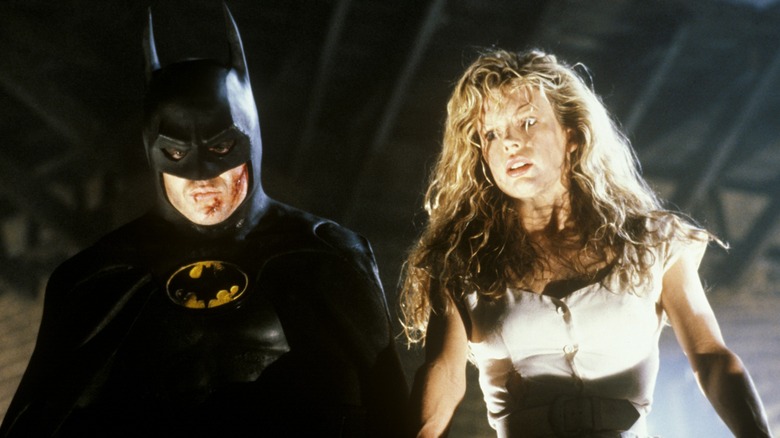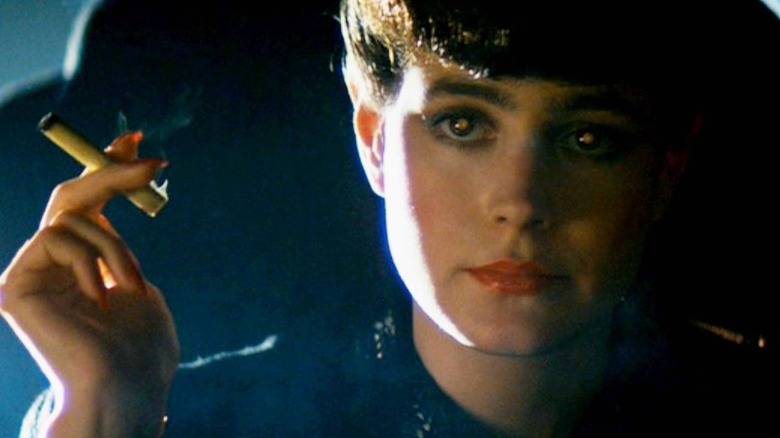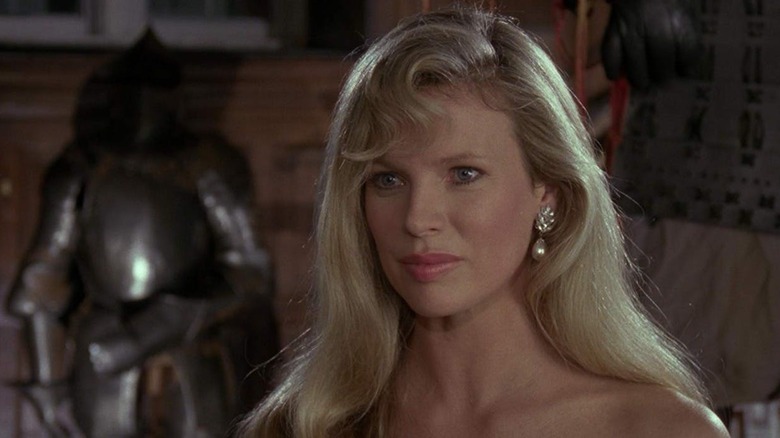One Table Read Nearly Tanked Burton's Batman
As Robert Pattinson makes his debut as one of the world's most iconic superheroes, it's easy to forget how the first live-action Batman film helped to cement the character as an irreplaceable figure in American pop culture. Tim Burton's "Batman" was a financial and critical success that spawned three sequels, one of which was good. Batman would later receive a darker, grittier portrayal with The Dark Knight trilogy, followed by an even darker and grittier portrayal in the DC Extended Universe.
It all stems back to the classic 1989 film starring Michael Keaton, which had a bumpier road to theaters than you may have guessed. Not only did most Hollywood studios lack faith in the idea of a successful Batman film (believing Superman to be the more marketable character), but they were also forced to recast the actress for love interest Vicki Vale fairly late in the process. Although Kim Basinger's portrayal of Vale received positive reception, the character was originally meant to be played by Sean Young, who wasn't always happy about the way her character was written.
'People's jobs are on the line'
In an interview with The Hollywood Reporter, actor Robert Wuhl (who played journalist Alexander Knox in the movie) described how the first table read before filming went well, but the second one was a disaster. After a round of rewrites where a lot of Vicki's lines were cut, Sean Young commented that, "I feel like I'm disappearing from the pages." As Wuhl explains, "And then [she] proceeded ... for the rest of the reading to read in a monosyllable, monotone voice. It sucked all the energy out of the room."
Although Wuhl emphasized that he's still on good terms with Young and he agreed that her character was being unfairly reduced, he was still frustrated with the way she chose to handle the situation. "The way she sabotaged the rest of the reading with all the brass there on the most expensive movie of all time ... people's jobs are on the line. That was a really touchy moment."
After that uncomfortable second table read, Vicki Vale was given more to do in the script. Young never got to play the character, however, due to a horse-riding accident that left her unable to perform. As Wuhl put it, "To some Warner Bros. executives, this was a blessing in disguise. The fact is they were very happy to replace her."
The underdeveloped Vicki Vale
The table read incident wasn't the first case of behind-the-scenes troubles involving Sean Young. Throughout the production of "Blade Runner," she reportedly felt pressured by director Ridley Scott to date him, and then subsequently felt like she was being punished by him when she refused to do so. By most accounts she wasn't treated that well by her co-star Harrison Ford either, which partly explains why their characters' infamously uncomfortable love scene in the movie came off the way it did. According to LA Magazine, her characters' tears in that scene were "very much real," with Young explaining: "I did hit my back pretty hard. And I did cry a lot. But I think it was exactly what Ridley wanted."
Although Young has expressed regret over the horse accident that cost her the role of Vicki, believing that the role likely would've led to more big roles for her down the line, ultimately it seems hard to blame her too much for being disappointed in the way her character was handled. Even in the final cut of the film, Vicki Vale proved to be a fairly thankless role. Described by Kim Basinger as not much more than a standard damsel in distress, Vicki was unceremoniously cut from "Batman Returns" to make room for Catwoman (Michelle Pfieffer), Batman's new love interest. Vicki's disappearance is only addressed by a quick throwaway line explaining that she left Bruce sometime before the start of the sequel.
Although Tim Burton's "Batman" is still widely beloved, fans of Young's iconic portrayal of the replicant Rachael in "Blade Runner" can't help but feel disappointed that she missed out on such a big role. Young's acting career never quite returned to the height of "Blade Runner," whereas Basinger's career continued strong for decades after.


